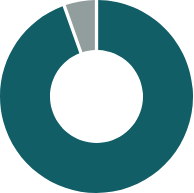Program Evaluation Data
Based on the most recent program evaluation data (September 1, 2022 – August 31, 2023)
Moody Neuro at Galveston discharged
Moody Neuro at Lubbock discharged
80
110

%
have a diagnosis of TBI
%
have a diagnosis of stroke
%
have brain injuries from other etiologies such as anoxia, encephalitis, infectious disorders or gunshot wounds, or have a complete spinal cord injury
Approximately 70% of patients admitted were male
41
The average age was approximately 41
(range: 18-80)
At discharge, greater than 93% of patients return to their own home or a family home.
Approximately 7% are discharged to assisted living or long-term care facilities

%
rate clinical services as above average or excellent

%
rate residential facilities and direct care as above average or excellent

%
of families would recommend Moody Neuro to others
During the 2022-2023 fiscal year:
Patients who are age 16 or 17 years may be considered for outpatient services on a case-by-case basis
1 - 2
Moody Neuro will provide residential services to patients that have complete spinal cord injuries (SCI). During the 2022-2023 fiscal year:
Galveston
2
Served two residential patients with SCI
Lubbock
11
Served eleven residential patients with SCI
We are current in our knowledge and innovative in our treatment practices and use of technology
The Spinal cord rehabilitation program focuses on advanced functional training, including independence with bathing and bowel and bladder care
The patient may continue to work on building strength and endurance while waiting for a body jacket or neck brace to be removed. Once the body jacket or the neck brace is removed, the patient will be able to participate in more advanced activities
The purpose of the SCI Rehabilitation Program:
To provide information about community resources to our patients and their families
To train family members and other caregivers to provide appropriate care
To provide appropriate referrals for care following discharge
